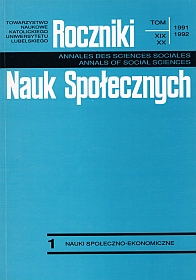Man's Social Rights in the Encyclical Rerum novarum
Abstract
The author severely criticizes the views of those authors who claim that the Church took an interest in human rights as late as in the encyclical Pacem in terris by John XXIII. He also proves the popes' critical standpoint towards the 18th-century conception of human rights was imposed by doctrinal and social reasons, and not by the conservatism of the then popes. He proves that Leo XIII dealt in Rerum novarum with human social matters. The author even calls Rerum novarum the declaration of man's social rights. He reads the following rights out of the encyclical: man's right to his own property, to just wages, to proper wages, right to labour, to rest, to associate and to equality − to equality in dignity, but not to equality in terms of mathematical calculation of wages or living standard. The author does not agree with the opinions according to which there is a contradiction or conflict between freedom and equality. He is of the opinion that there is a contradiction between philosophical liberalism and Marxian collectivism − between their conceptions of freedom and equality. The author points out that it was Leo XIII who pinpointed that the basis of human rights is the dignity of human persons. The popes who followed him kept drawing on to this thought as well as UN (The Common Declaration of Human Rights and Pacts of Human Rights).
The author proves that according to the encyclical the supporting and putting in to practice of the social rights lays on three subjects: the Church, the State and trade unions. The Church fulfills this task through teaching, upbringing and practical activity. The State has a duty to put those rights into practice in two ways: by means of the development of socio-economical policy and appropriate legislature − legal system. Trade unions contribute to the safeguard of human rights of the working people by fulfilling the revindicative and creative function.
The author reads out of Rerum novarum the so-called personalistic principle − the principle of human person dignity which we find not only in the documents of the Church's Magisterium proclaimed after − Rerum novarum but also in the UN's documents and in many constitutions of the contemporary countries.
Copyright (c) 1992 Roczniki Nauk Społecznych

This work is licensed under a Creative Commons Attribution-NonCommercial-NoDerivatives 4.0 International License.


